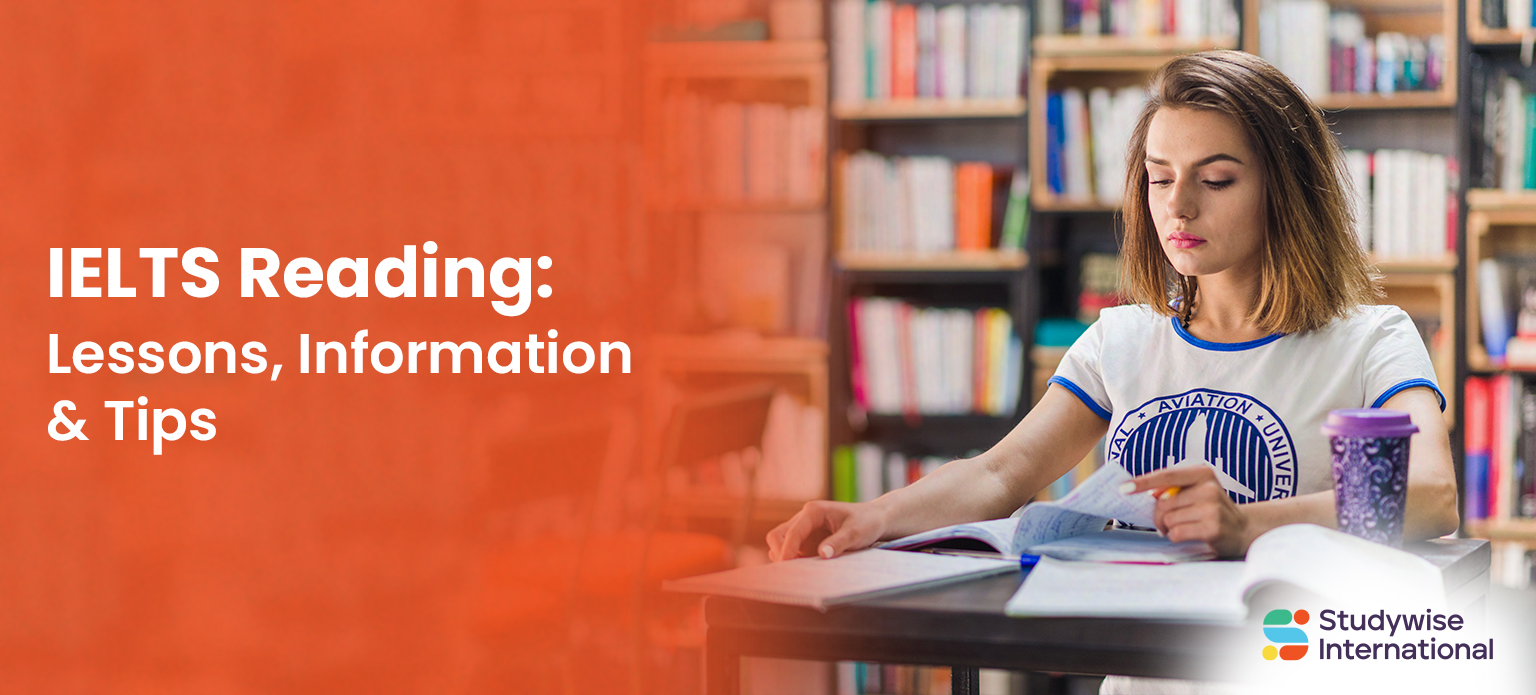
IELTS Reading: Lessons, Information and Tips
- Categories Abroad Test Preparation, All Study in Abroad Blogs, IELTS
- Date May 24, 2024
IELTS is the English proficiency test standardised in almost all global universities. It is an inevitable step of the ladder to your dream destination. Whether you study Healthcare Administration in Canada or pursuing an MBA in the USA. There are two types of IELTS – Academic and General. Students planning to pursue a UG, PG or doctoral course abroad, need to take IELTS Academic test. With this, they represent their language proficiency to both the universities and the government to ensure that they can get along the academic instructions and learnings.
The reading skills section is common in both the rests with questions on prediction, finding specific information, identifying opinions and more. The IELTS-A has three long academic tests taken from academic journals, magazines, books and newspapers. While the General tests have a mixture of long and short texts from notices, flyers, timetables, documents, newspapers, instructions and manuals. In this blog, we will be discussing in depth in regards with the academic test for international students.
What skills will be tested?
The reading paper tests several skills. Notably, IELTS-A is a vocabulary test. Students need to practice skills like Completing the diagram, table or summary, Finding specific Information, Telling the difference between main ideas and supporting details and Following key arguments. Furthermore, Identifying the writer’s opinion and Identifying the writer’s purpose are also some key skills to develop.
What are the different types of questions in the IELTS reading section?
IELTS is designed to test different skills. Equally important, the reading section includes questions that students need to prepare for considering that aspect of the test. Some of the known types of questions are:
- Sentence Completion
- Summary: Note, table, flow-chart completion
- Shor-answer questions
- Diagram label completion
- Multiple choice
- Matching information
- Matching headings
- Matching sentence endings
- True, false, no given
How to improve my reading skills before the exam?
Noticed how some readers seem to flip pages while reading a novel? And it made you think how weirdly their eyes moved from left to right to left to right like a scanner. You could be that weirdo! Everyone has different reading and writing speeds. Hence, students answer questions at different speeds. In order to do that, students could simply add reading to their routine. Reading everyday materials like newspapers and advertisements would not only enhance their knowledge of the happenings of the world but it would also help them speed up their reading. Significantly, reading books, journals and magazines would help students read more relatable content for their exams.
How to get a 7.0 band in IELTS?
IELTS scoring is drafted on a percentile basis. This means that your scorecard not only depends on you but the difficulty level of the test. Moreover, on how other students took the same test. The reading section has a total of 40 questions. Each carries a +1 mark. To get a 7 band, students must answer at least 30-32 of these correctly.
How to manage time during the test?
The reading section encompasses the time duration of an hour. 60 minutes. For 40 questions. Unlike the listening tests, no extra time is rewarded. This means that students have 20 minutes to go through and answer each sub-section. Some questions will take longer than others, and that is alright. As you go forward in the question sheet, the level of difficulty rises. It is a contemporary idea but it does work for some students to start from the last. To clarify, some questions could be more difficult than others. And the method should be practised over mock tests before implementing on the exam.
Another common practice to save time is to read the questions before going through the text. Further, after paying attention to the introduction and conclusion, skim through the passage and identify the keywords and phrases. Lastly, answer the question and jot it down in your answer sheet.
How to understand every word in the passage?
You cannot. Or maybe you can. But more importantly, you don’t have to. While a wide vocabulary helps crack IELTS-A, it doesn’t demand you to be Shashi Tharoor. When unsure of what the word means, look at the words and sentences around it to get a hint. Factually, not even IELTS teachers understand words when they first stumble upon them. What they do, what you should too, is make a habit of learning them as they go. Saw a word you are unfamiliar with, pick up the dictionary, or better, just Google. Additionally, keep a note of meanings, synonyms, antonyms, etc. to keep reviewing with time.
At the exam centre, take a deep breath and remember that it is okay if you don’t know a few words. More often than not, that big fancy word is not relevant to the answer you need. If you cannot find a meaning within the sentence, move on. You still have 39 arrows in your quiver.
What is the easiest way to eliminate errors?
This is where even the good students look for marks. Reading the instructions. Read every word. Preach it. Chew and swallow it. Reading as well as listening tests have specific instructions before all questions. While you might have the right answer, not following the guidelines will make it all go in vain. For instance, when the instruction says ‘write two words and/or a number’, the acceptable responses are 10 black cars, ten black cars and black cars. Yes, writing the number in words has the same effect. Similarly, if you want to answer with black and white, answer with black, white or white, black. If you lack words, insert an article!
Later, when transferring your answers to the sheet, take all the care that you possibly can. Often students don’t plan for enough time to transfer their answers and make errors while doing it. Divide you time to avail enough portion to transfer and recheck your answers. Don’t know some? Take your chances. You have got nothing to lose on them.
How to avoid panicking during the exam?
Students often panic when they stumble upon words and questions they don’t understand. Or when a question is taking too much time. The simplest way to eliminate panic is practice. Always time yourself when studying or solving previous papers. Some of the questions will be more difficult and they WILL take more time. However, some will take less time than you had allotted. Do not spare more time than 20-25 minutes for one passage. If the questions seem blurry, you can always circle back to that one after completing the rest of the test.
Take mock tests every week, or twice a week if you can. They help prepare for all possibilities. Further, take the tests twice. One by the clock and one by taking the time you need. Reflect on the duration and results of both. It would help you find the errors and their patterns to work on. It is always a good idea to consult with an expert.
Want to ace IELTS-A? Connect with Studywise International today for a FREE DEMO SESSION today!
You may also like

Ireland Intake 2024-25: Universities & Preparation Timeline

TOEFL Scoring System and Validity


